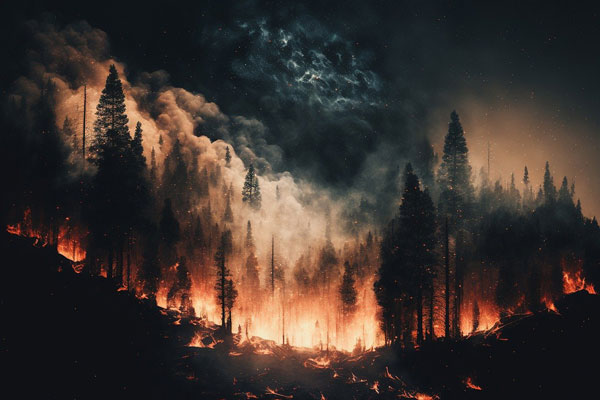Catastrophic Texas blaze raises awareness about wildfires

[Wildfire. Photo Credits to Pixabay]
In 2024, nature continues to reveal its formidable power, with one of its most dangerous feats being the Smokehouse Fire Creek - the largest wildfire in Texas history.
This catastrophic event has burned down over one million acres, surpassing any previous records that came before it.
Texas Governor Greg Abott even declared that 60 counties were affected by this tragedy, which was fueled by high winds and dry conditions.
The state has never witnessed a catastrophic disaster of this magnitude, which caused unprecedented environmental and human harm.
The wildfire left 11,000 people without electricity, destroyed over 130 homes, and reduced numerous communities to rubble.
The devastation wrought by the Smokehouse Fire Creek has drawn national attention, and prompted swift action from federal authorities.
President Biden authorized the deployment of additional federal resources to aid in firefighting efforts and support the affected communities.
This federal assistance includes emergency funding, deployment of the National Guard, and coordination with the Federal Emergency Management Agency (FEMA) to provide immediate relief and long-term recovery plans.
The combined state and federal response highlights the severity of the disaster and the urgent need for comprehensive support to those affected.
The environmental impact of the wildlife is staggering.
Over one million acres of diverse ecosystems have been scorched, including critical habitats for endangered species.
Conservationists are particularly concerned about the long-term effects on biodiversity, as many plants and animals may struggle to recover from such extensive habitat loss.
The destruction of forests and grasslands also increases the risk of soil erosion, further threatening the delicate balance of the region’s ecosystems.
Rebuilding these natural areas will require significant time, resources, and coordinated efforts from environmental organizations and government agencies.
The negative impacts of habitat destruction are not confined to the immediate loss of biodiversity; they also set the stage for more severe environmental catastrophes.
One of the most destructive consequences of such degradation is the increased susceptibility to wildfires.
Wildfires have the potential to be ignited by environmental factors such as lightning and thunder, which can lead to the destruction of many precious habitats and species.
However, the massive wildfires that society deems hazardous actually have more backstory than simply being caused by climate change and drought.
The National Interagency Fire Center claims that 87% of all wildfires across the United States are caused by the reckless and incautious behavior of humans, not by natural environmental causes.
Unattended campfires, discarded cigarettes, and careless debris burning are among the leading causes.
For instance, wildfires sparked by cigarettes in 2017 resulted in $6 billion in damages.
A single cigarette butt can ignite hundreds of acres.
Similarly, unattended campfires can re-ignite and spread, causing extensive damage.
|
Preventing wildfires requires vigilance and responsible behavior.
Campers should avoid areas with dry grass and low branches, and ensure fires are completely extinguished before leaving.
Debris burning should be done safely, in stable conditions, and in controlled environments.
Proper disposal of cigarettes and other potential fire starters is crucial.
By being cautious and aware of their surroundings, individuals can prevent most wildfires.
Preventable wildfires threaten more than natural resources; they endanger lives.
They harm the symbiotic balance of the flow of life, and put many crucial species at risk.
There are many ways to prevent these national disasters from occurring on a daily basis, and just being more aware of the surroundings can stop more than 90% of them.
Through cooperation and commitment to environmental protection, society can reduce the occurrence of destructive wildfires.
As a united community, it is essential to safeguard the environment and wildlife from these preventable tragedies.

- Daniel Pi / Grade 10 Session 5
- Round Rock High School

![THE HERALD STUDENT REPORTERS [US]](/assets/images/logo_student_us.png)
![THE HERALD STUDENT REPORTERS [Canada]](/assets/images/logo_student_ca.png)
